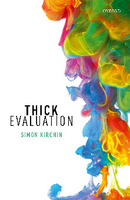Thick Evaluation
| dc.contributor.author | Kirchin, Simon | |
| dc.date.accessioned | 2017-11-01 23:55:55 | |
| dc.date.accessioned | 2018-10-03 09:09:28 | |
| dc.date.accessioned | 2020-04-01T13:21:27Z | |
| dc.date.available | 2020-04-01T13:21:27Z | |
| dc.date.issued | 2017 | |
| dc.identifier | 640316 | |
| dc.identifier | OCN: 1011496942 | en_US |
| dc.identifier.uri | http://library.oapen.org/handle/20.500.12657/31028 | |
| dc.description.abstract | "We use evaluative terms and concepts every day. We call actions right and wrong, teachers wise and ignorant, and pictures elegant and grotesque. Philosophers place evaluative concepts into two camps. Thin concepts, such as goodness and badness, and rightness and wrongness have evaluative content, but they supposedly have no or hardly any nonevaluative, descriptive content: they supposedly give little or no specific idea about the character of the person or thing described. In contrast, thick concepts such as kindness, elegance and wisdom supposedly give a more specific idea of people or things. Yet, given typical linguistic conventions, thick concepts also convey evaluation. Kind people are often viewed positively whilst ignorance has negative connotations. The distinction between thin and thick concepts is frequently drawn in philosophy and is central to everyday life. However, very few articles or books discuss the distinction. In this full-length study, Simon Kirchin discusses thin and thick concepts, highlighting key assumptions, questions and arguments, many of which have gone unnoticed. Kirchin focuses in on the debate between 'separationists' (those who think that thick concepts can be separated into component parts of evaluative, often very 'thin', content and nonevaluative content) and 'nonseparationists' (who deny this). Thick Evaluation argues for a version of nonseparationism, and in doing so argues both that many concepts are evaluative and also that evaluation is not exhausted by thin positive and negative stances." | |
| dc.language | English | |
| dc.subject.classification | thema EDItEUR::C Language and Linguistics::CF Linguistics::CFA Philosophy of language | en_US |
| dc.subject.classification | thema EDItEUR::Q Philosophy and Religion::QD Philosophy | en_US |
| dc.subject.classification | thema EDItEUR::Q Philosophy and Religion::QD Philosophy::QDT Topics in philosophy::QDTK Philosophy: epistemology and theory of knowledge | en_US |
| dc.subject.classification | thema EDItEUR::Q Philosophy and Religion::QD Philosophy::QDT Topics in philosophy::QDTQ Ethics and moral philosophy | en_US |
| dc.subject.other | descriptive content | |
| dc.subject.other | evaluation | |
| dc.subject.other | ethics | |
| dc.subject.other | thick concepts | |
| dc.subject.other | thin concepts | |
| dc.subject.other | aesthetics | |
| dc.subject.other | Genus | |
| dc.subject.other | Good and evil | |
| dc.subject.other | Non-cognitivism | |
| dc.subject.other | Semantics | |
| dc.subject.other | Separation of church and state | |
| dc.subject.other | Species | |
| dc.title | Thick Evaluation | |
| dc.type | book | |
| oapen.identifier.doi | 10.1093/oso/9780198803430.001.0001 | |
| oapen.relation.isPublishedBy | b9501915-cdee-4f2a-8030-9c0b187854b2 | |
| oapen.relation.isbn | 9780198803430 | |
| oapen.pages | 224 | |
| oapen.remark.public | Relevant Wikipedia pages: Ethics - https://en.wikipedia.org/wiki/Ethics; Genus - https://en.wikipedia.org/wiki/Genus; Good and evil - https://en.wikipedia.org/wiki/Good_and_evil; Non-cognitivism - https://en.wikipedia.org/wiki/Non-cognitivism; Semantics - https://en.wikipedia.org/wiki/Semantics; Separation of church and state - https://en.wikipedia.org/wiki/Separation_of_church_and_state; Species - https://en.wikipedia.org/wiki/Species | |
| oapen.identifier.ocn | 1011496942 |

